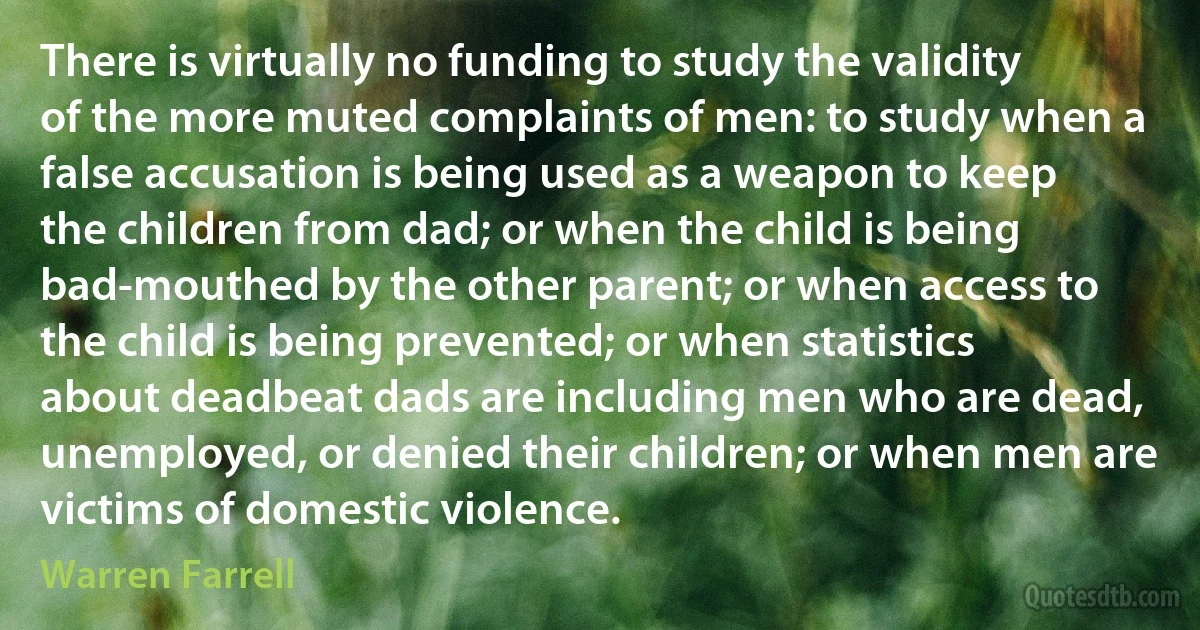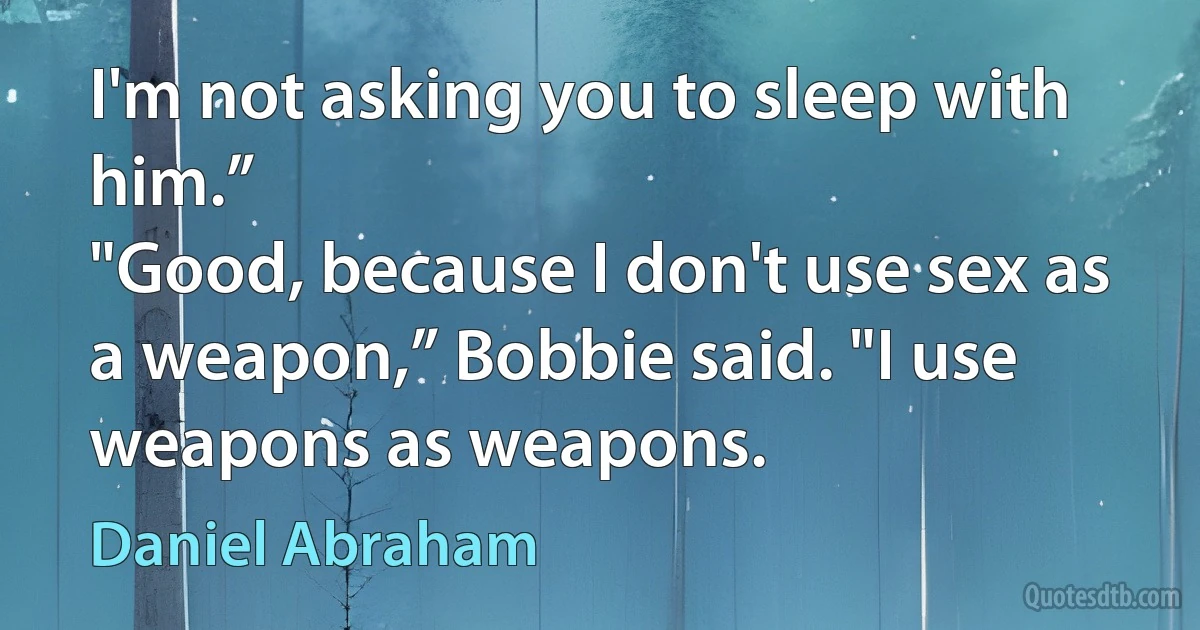Weapon Quotes - page 26
Terror is not a new weapon. Throughout history it has been used by those who could not prevail, either by persuasion or example. But inevitably they fail, either because men are not afraid to die for a life worth living, or because the terrorists themselves came to realize that free men cannot be frightened by threats, and that aggression would meet its own response.

John F. Kennedy
In free society art is not a weapon and it does not belong to the spheres of polemic and ideology. Artists are not engineers of the soul. It may be different elsewhere. But democratic society - in it, the highest duty of the writer, the composer, the artist is to remain true to himself and to let the chips fall where they may. In serving his vision of the truth, the artist best serves his nation. And the nation which disdains the mission of art invites the fate of Robert Frost's hired man, the fate of having "nothing to look backward to with pride, and nothing to look forward to with hope."

John F. Kennedy
Secretary of War Stimson, visiting my headquarters in Germany, informed me that our government was preparing to drop an atomic bomb on Japan. I was one of those who felt that there were a number of cogent reasons to question the wisdom of such an act. ...the Secretary, upon giving me the news of the successful bomb test in New Mexico, and of the plan for using it, asked for my reaction, apparently expecting a vigorous assent.
During his recitation of the relevant facts, I had been conscious of a feeling of depression and so I voiced to him my grave misgivings, first on the basis of my belief that Japan was already defeated and that dropping the bomb was completely unnecessary, and secondly because I thought that our country should avoid shocking world opinion by the use of a weapon whose employment was, I thought, no longer mandatory as a measure to save American lives. It was my belief that Japan was, at that very moment, seeking some way to surrender with a minimum loss of 'face.

Dwight D. Eisenhower
The Labour Party, obviously intends to fasten upon our backs the accusation of being 'warmongers' and they are suggesting that we have 'hush hush' plans for rearmament which we are concealing from the people. As a matter of fact we are working on plans for rearmament at an early date for the situation in Europe is most alarming... We are not sufficiently advanced to reveal our ideas to the public, but of course we cannot deny the general charge of rearmament and no doubt if we try to keep our ideas secret till after the election, we should either fail, or if we succeeded, lay ourselves open to the far more damaging accusation that we had deliberately deceived the people... I have therefore suggested that we should take the bold course of actually appealing to the country on a defence programme, thus turning the Labour party's dishonest weapon into a boomerang.

Neville Chamberlain
She understood on a deep, animal level that sex was like music or language. It could express anything. Love, yes. Or anger, or bitterness, or despair. It could be a way to grieve or a way to take revenge. It could be a weapon or a nightmare or a solace. Sex was meaningless, and so it could mean anything.

Daniel Abraham
Hayek sees that the zero-sum vision is fired by an implacable negative energy. It is not the concrete vision of some real alternative that animates the socialist critic of the capitalist order. It is hostility toward the actual, and in particular toward those who enjoy advantages within it. Hence the belief in equality remains vague and undefined, except negatively. For it is essentially a weapon against the existing order – a way of undermining its claims to legitimacy, by discovering a victim for every form of success. The striving for equality is, in other words, based in ressentiment in Nietzsche's sense, the state of mind that Max Scheler identified as the principal motive behind the socialist orthodoxy of his day. It is one of the major problems of modern politics, which no classical liberal could possibly solve, how to govern a society in which resentment has acquired the kind of privileged social, intellectual, and political position that we witness today.

Friedrich Hayek
The impeachment process was never intended to become a weapon for a partisan majority in Congress to attack the President. To do so is a violation of the fundamental separation of powers doctrine at the heart of the Constitution. It is an invitation to future partisan majorities in future Congresses to use the impeachment power to undermine the President. It could weaken Republican and Democratic Presidents alike for years to come. This case is a constitutional travesty. We deplore the conduct of President Clinton that led to this yearlong distraction for the nation. But we should deplore even more the partisan attempt to abuse the Constitution by misusing the impeachment power.

Ted Kennedy
Nuclear proliferation is on the rise. Equipment, material and training were once largely inaccessible. Today, however, there is a sophisticated worldwide network that can deliver systems for producing material usable in weapons. The demand clearly exists: countries remain interested in the illicit acquisition of weapons of mass destruction.
If we sit idly by, this trend will continue. Countries that perceive themselves to be vulnerable can be expected to try to redress that vulnerability - and in some cases they will pursue clandestine weapons programs. The supply network will grow, making it easier to acquire nuclear weapon expertise and materials. Eventually, inevitably, terrorists will gain access to such materials and technology, if not actual weapons.
If the world does not change course, we risk self-destruction.

Mohamed ElBaradei
I can't even think about this movie. I don't WANT to think about it because if I think about it I will have to face an ugly truth that has been gnawing through my head...
This started out as a documentary on gun violence in America, but the largest mass murder in our history was just committed - without the use of a single gun! Not a single bullet fired! No bomb was set off, no missile was fired, no weapon (i.e., a device that was solely and specifically manufactured to kill humans) was used. A boxcutter! - I can't stop thinking about this. A thousand gun control laws would not have prevented this massacre. What am I doing?

Michael Moore
[on WMDs in Iraq] If they couldn't find the weapons, which were the reason we went to war, then why didn't they make something up? Why did they stop lying?! My government has always lied to me; I'm comfortable with that! Son of a bitch! What's so tough?! They could have done it simply! Just send two kids to Kinko's - "I need a picture of a camel WITH A NUCLEAR WEAPON ON ITS BACK!"

Lewis Black
Lacking the military strength to challenge us directly, the terrorists have chosen the weapon of fear. When they murder children at a school in Beslan or blow up commuters in London or behead a bound captive the terrorists hope these horrors will break our will, allowing the violent to inherit the earth. But they have miscalculated: We love our freedom, and we will fight to keep it.

George W. Bush
Have you determined if it is meant to be a weapon at all?” she said.
"We've got some very dead people to account for,” Miles pointed out.
"That, alas, does not necessarily require a weapon.” Professor Vorthys said. "Carelessness, stupidity, haste, and ignorance are quite as powerfully destructive forces as homicidal intent.

Lois McMaster Bujold
When the first flint, the first shell, was shaped into a weapon, that action shaped man. As he molded and complicated his tools, so they molded and complicated him. He became the first scientific animal. And at last, via information theory and great computers, he gained knowledge of all his parts. He formed the Laws of Integration, which reveal all beings as part of a pattern and show them their part in the pattern. There is only the pattern; the pattern is all the universe, creator and created.

Brian Aldiss
In my first year I was taught about the slide rule. They said, "The slide rule is important. Without it you can do nothing. The slide rule is the modern weapon of efficiency. With the slide rule you can get from here to the stars. Buy it, use it – your slide rule!" Within one year it was, "Burn the slide rule. The calculator can add up with none of this fucking sliding the shit around and working out where that bit in the middle goes. Smash it over your head."

Eddie Izzard
His conflict with the Catholic Church arose because deep in his heart Galileo was a believer. There was for him no path of compromise, no way to have separate secular and theological cosmologies. If the Copernican system was true as he believed, what else could Galileo do but fight with every weapon he had in his arsenal... to make his Church accept a new system of the universe. ...In the contrast between Galileo's heroic stand when he tried to reform the cosmological basis of orthodox theology and his humbled, kneeling surrender when he disavowed his Copernicanism, we may sense the tremendous forces attendant on the birth of modern science.

Galileo Galilei



